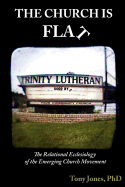I find it more than a little ironic that Andy Campbell’s primary criticism of my book is my proximity to the subject matter. He is disappointed with my lack of objectivity. Yet he begins his review with an admission that he flirted with the emerging church movement a decade ago but withdrew to campus ministry because of his disappointment with the movement. I wonder, does that disqualify him from writing a review of my book on the movement?
Yes, I am a participant-observer in the ECM, as I repeatedly make clear in the book. That no more disqualifies me from researching and making constructive suggestions for the movement than a professor at Perkins is disqualified from researching the United Methodist Church or a doctoral candidate at Princeton is disqualified from investigating the Presbyterian Church (USA).
Objectivity in the social sciences is a unicorn. It never existed. Just ask Christian Smith, who after years of researching his fellow evangelicals converted to Catholicism. Anyone who does research is affected by that research. And, if they’re paying attention, the object of the research is similarly affected. I pray that evangelicals read Smith’s books and are chastened, and that people in the Vineyard will closely read T.M. Luhrmann’s masterful new book, When God Talks Back.
Regarding Andy’s charge that my anecdotes are too heavily weighted on two congregations, I’m afraid he’s correct. Those are the two congregations with whom I spent the most time, and probably with whom I’m most sympathetic. In my trade book on the ECM, The New Christians, I make my argument with anecdotes, and the stories are spread equally across the congregations.
But in The Church Is Flat, I make my argument using research and theological rationale. The anecdotes are merely illustrative, so I hope that my use of stories from these two congregations does not fatally cripple my thesis.
Similarly, Andy is right to note that there is little mention of the life of ECM congregations outside of the Sunday worship gathering. I ended my research with hundreds and hundreds of pages of transcribed interviews as well as 2,022 completed surveys. The scope of my book limited what I could report on, so I chose to look at the act of worship and gathering. Further, I’ll be the first to admit that I’m a theologian, not a social scientist. I am happy two report that two sociologists have requested my data, so here’s hoping they can do even more with it than I could.
Andy asks what congregations I would choose if I had to conduct my research today. Most of the congregations would be the same, but the criteria for inclusion would be somewhat different. Plus, I would look at more congregations: House for All Sinners and Saints in Denver, Common Table in Washington, D.C., Mercy Seat in Minneapolis, and others.
As Andy notes, the ECM has borne fruit. I’m glad that he finds that a salutary development. I sure do. But I also worry, as he notes, that the ECM might be torn asunder by centrifugal forces. It seems to me that a movement whose glue is relationality is far more tenuous than one whose glue is doctrine or a magisterium. Will the sinful human proclivity toward broken relationships ultimately doom the movement? It is my hope that Moltmann’s relational ecclesiology can help us avoid that fate, but I suppose that only time will tell.
——–
Tony Jones is theologian-in-residence at Solomon’s Porch in Minneapolis and an adjunct professor at Fuller Theological Seminary and at Andover Newton Theological School. Tony serves as a senior acquisitions editor at sparkhouse. Tony is the author of many books on Christian ministry and spirituality and is a sought after speaker and consultant in the areas of emerging church, postmodernism, and Christian spirituality. You can find out more about Tony and how to contact him here.